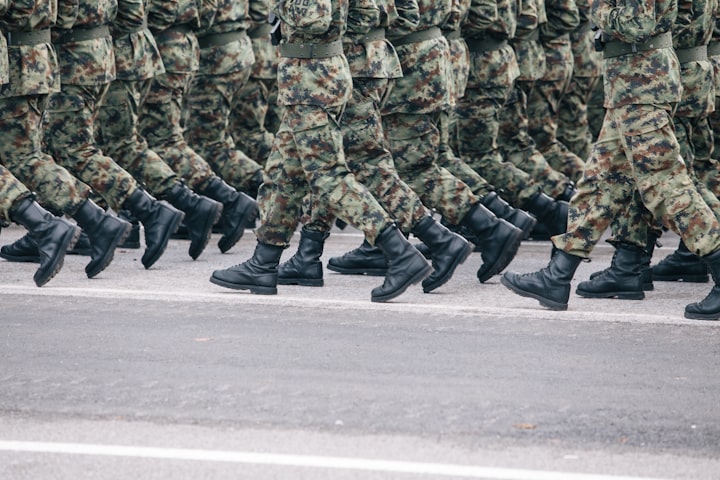5 countries with the most soldiers
top best

The Five Giants: Countries with the Most Soldiers
Military might is a complex issue, encompassing factors like troop numbers, advanced weaponry, and technological prowess. However, troop strength remains a significant indicator of a nation's ability to project power and defend its interests. Here, we delve into the five countries with the largest active military personnel, exploring the reasons behind their sizeable forces and potential ramifications.
1. The United States: A Global Force
The United States stands tall as the undisputed leader in terms of active military personnel. With an estimated 1.4 million active troops according to the International Institute for Strategic Studies (IISS), the US military is a formidable force. This dominance stems from several factors:
Global Security Commitments: The US maintains a network of overseas bases and military alliances (NATO, for example) that necessitate a large force for deployment and deterrence.
Technological Superiority: The US invests heavily in research and development, leading to a military equipped with cutting-edge weaponry and technology, allowing them to maintain a smaller but more efficient fighting force.
Historical Legacy: As a victor in World War II and a major player in the Cold War, the US inherited a vast military infrastructure and continues to prioritize its military strength.
2. Russia: A Legacy of Power
Russia boasts an estimated active military force of around 900,000 personnel, making it the second-largest in the world. This strength reflects its historical emphasis on military power:
Soviet Legacy: The USSR, Russia's predecessor, built a massive military apparatus during the Cold War. While it has undergone modernization efforts, a large portion of Russia's force still relies on Soviet-era equipment and strategies.
Geopolitical Concerns: Russia faces a vast landmass to defend and potential threats from neighboring regions. This necessitates a large standing army for territorial security.
Nuclear Deterrence: Russia possesses a significant nuclear arsenal, and its conventional military serves as a deterrent against potential aggressors.
3. China: The Rising Dragon
China has experienced a rapid military buildup in recent decades. Estimates suggest an active military force of around 1.3 million personnel, making it the world's third-largest. This expansion is driven by several factors:
Economic Growth and Ambition: China's economic boom has allowed for increased investment in military technology and force modernization.
Territorial Disputes: China is engaged in territorial disputes with several neighboring countries, necessitating a strong military presence to assert its claims.
National Security: China views the US as a potential threat and is actively developing its military capabilities to counter American influence in the region.
4. India: A Balancing Act
India boasts an estimated 1.4 million active military personnel, making it the fourth-largest globally. This sizeable force can be attributed to several factors:
Longstanding Rivalries: India has a history of border disputes with its neighbors, particularly Pakistan, necessitating a large military for defense.
Internal Security Threats: India faces internal security challenges from insurgencies and terrorist groups, requiring a strong military presence for domestic stability.
Regional Power Aspirations: India aspires to be a major player in Asia and views a strong military as essential to projecting its influence and securing its interests.
5. North Korea: The Enigmatic Power
North Korea presents a unique case. While estimates vary, its active military force is believed to be around 1.2 million, making it the world's fifth-largest. However, the size doesn't necessarily translate to modern military might:
Focus on Quantity over Quality: North Korea prioritizes troop numbers over advanced weaponry. Their military relies heavily on outdated equipment and conscript soldiers.
Nuclear Ambition: North Korea's pursuit of nuclear weapons serves as a deterrent, allowing them to compensate for conventional military shortcomings.
Regime Security: The North Korean regime prioritizes maintaining control and uses its military to suppress dissent and deter external threats.
The Implications of Large Military Forces
While large militaries can provide security and deter aggression, they also come with significant drawbacks:
Economic Burden: Maintaining a large military requires substantial financial resources, diverting funds from other areas like social welfare and infrastructure development.
Increased Tensions: A strong military presence can be perceived as a threat by neighboring countries, leading to regional instability and an arms race.
Risk of Escalation: Large militaries can heighten the risk of accidental conflicts escalating into full-blown wars.
Beyond Numbers: A Multifaceted Viewpoint
It's important to go beyond simply counting soldiers. Modern warfare involves a complex interplay of factors like:
Technology: Advanced weaponry, such as drones and cyberwarfare capabilities, can significantly influence military power.
Training and Tactics: Well-trained and strategically adept forces can often overcome larger but
Logistics and Infrastructure: The ability to effectively move troops and supplies across vast distances is crucial for military success.
Conclusion
The five countries with the most soldiers represent a diverse range of motivations and capabilities. While military might offers a sense of security, it's not the sole determinant of a nation's power or influence. A focus on diplomacy, economic development, and technological advancement can contribute to global stability alongside a responsible approach to military power. As we navigate the complexities of the 21st century, fostering international cooperation and understanding remains paramount in ensuring a more peaceful and secure world.
About the Creator
Moharif Yulianto
a freelance writer and thesis preparation in his country, youtube content creator, facebook






Comments (1)
Very interesting. How does leadership factor in with perceived power and influence?